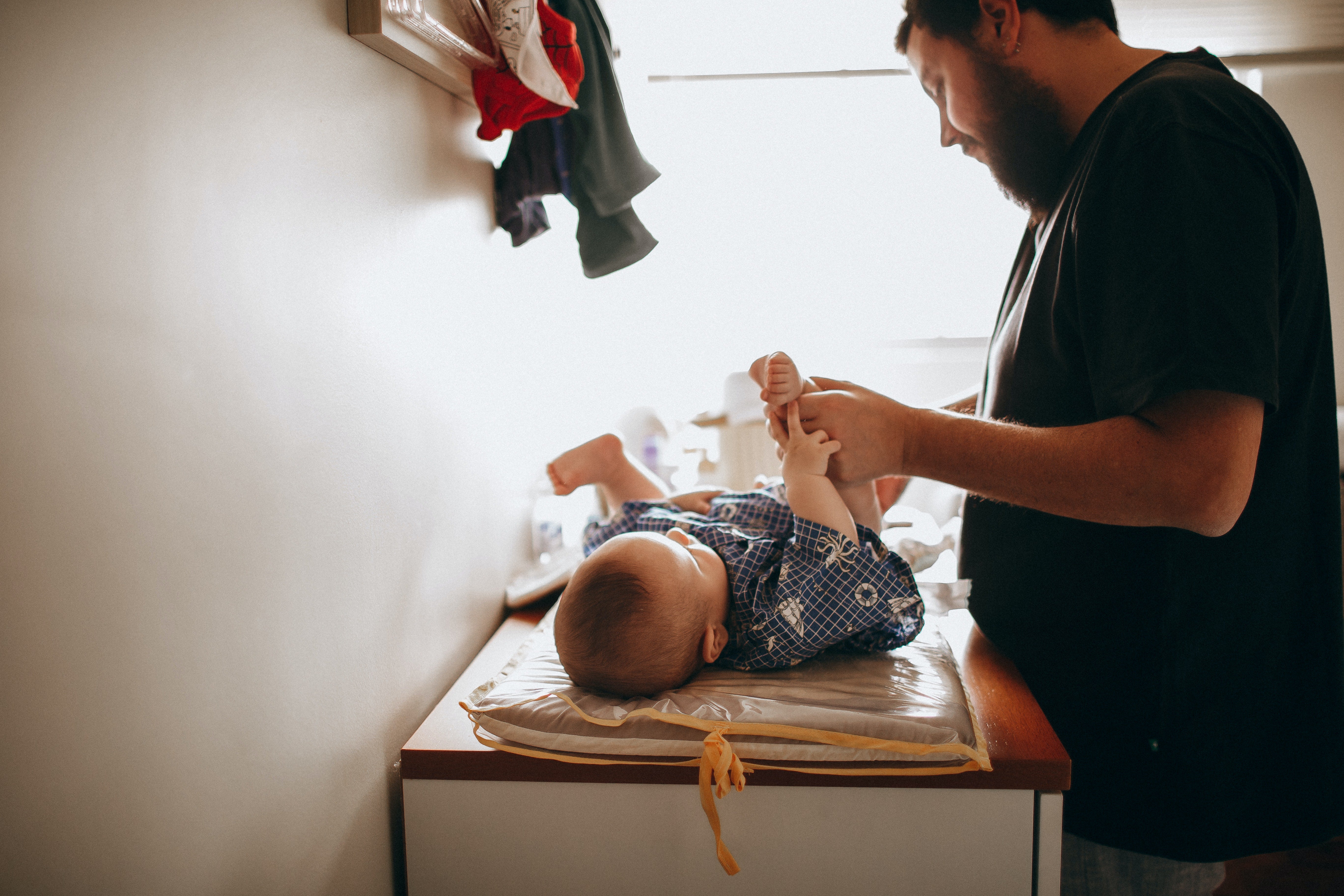Novice parents may never imagine that this soft little thing that is full of anticipation to welcome home can make them unable to sleep well for several years. From crying every hour at the beginning, to being able to sleep peacefully from 3-4 hours to all night, it seems like a century long.

It sounds like a contradiction. Newborns sleep almost the whole day. Why can't the accompanying new parents sleep well together? Newborns generally cannot sleep more than 1-2 hours in a row. It's like they have an alarm clock installed in their bodies, turning on a switch that makes them cry every 1-2 hours. Not to mention the annoying startle reflex, which will forcefully wake the baby up. It's not until new parents, normally moms, address their needs -- usually being hungry, peeing, pooping, or frightened -- that they don't go back to sleep.

If it is only during the day, it seems to be able to be OK. But what if it's 24 hours a day, for a month?
Some mothers already suffer from insomnia in the early pregnancy - and unfortunately, that is not the end of torture. Let us mourn the sluggishness and dark circles under the eyes of new mothers who are weak and in the desperate need of rest after childbirth.
Some angel babies can sleep through the night when they are a few months old. The fatigue of the novice parents can be fully resolved at night, so that they have sufficient energy to deal with the chores of the next day. But some babies, until the age of 6 months, only need a few hours of rest during the day, and they also need to wake up several times at night, tossing the new parents did not have to breathe.
Is there any way to save the new parents? So they can be relieved from the lack of sleep and exhaustion as soon as possible. We offer five solutions.
1. Take all the time to sleep
As mentioned above, newborns have at least 16 hours of sleep a day, if new parents can seize the 16 hours of quiet -- even half of them—to light sleep for 8 hours, that would be enough for the whole day energy requirement. Of course, this sounds a little too ideal. The reality may be that you just coaxed the little thing, just put him to bed peacefully, just packed up, just gently lay down, he ended the nap ready to wake up, you had to go to the next round of soothing.
But the world is not always desperate, and there’s always something to try. Try to accompany your child to sleep every time, and leave behind what the parenting experts say: "Don't breastfeeding to sleep" and "Don't cuddle to sleep". The little baby may wake up after half an hour of nap this time, and you haven't fallen asleep yet. But what if he slept 2-3 hours this time? That would be fantastic, right? Taking a step back, even if you can only close your eyes for half an hour, you can still close your eyes and rest your mind. If you can try effective sleep methods such as meditation and R90 sleep method, it can also help your brain quickly rejuvenate.
As for those menial, mind-numbing chores? Let's wait until you wake up from your nap.
2. Have you ever tried sleeping bags?
Because newborns lack control over their bodies, their creator has given them primitive forms of reflexes as temporary survival skills. When babies are startled by loud noises or large movements, they will always tilt their heads back, stretch out their arms and legs, and cry as a response, the academics called this moro reflex. Novice parents may observe that when the baby is sleeping soundly, he suddenly waved his little hand and began to cry. You have to stop what you're doing to calm him down, and this is where the moro reflex occurs. This reflex usually lasts until the baby is about 2 months old, and it is said that it will gradually disappear by the age of 6 months.
It can be said that moro reflex is one of the culprits that many small-month-old babies cannot sustain a sleep. In order to allow novice parents to enjoy a rare sleep and not be woken up by moro reflex, you can introduce wrapping sleeping bags. Enter “swaddle” as the keyword and you can find over 2000 purchase results on Amazon. It is usually designed with two pieces of cloth on either side of a normal sleeping bag, just like the two large wings of a butterfly. You can use these two wings to wrap a baby's hand, preventing them from waving again and waking up the world.

When the child is a little older and the moro reflex disappears, you can remove the wrap-around sleeping bag. But often by this time, they have a higher level of control over their bodies and have learned to lift their legs and smash the bed. If they are covered with a small blanket at this time, they will often kick the blanket to their feet, leaving their little tummies exposed and easily catching a fever.
Instead of getting up in the middle of the night to check whether his quilt is properly covered, it's better to put your baby in a breathable and constant temperature sleeping bag. The small hands and feet are gently wrapped in the sleeping bag, and no matter how the baby rolls over, it can firmly fit the body. In addition, changing the baby's sleeping bag before going to bed will also help them form a fixed bedtime routine. In their little head, associating "wearing a sleeping bag" with "going to bed" is also conducive to their cultivation of autonomy good habit of falling asleep. So far, novice parents are one step closer to liberating themselves.
3. Find a good helper
Generally speaking, from the moment the baby is born until they can fall asleep independently, the ones who contribute the most are the new mothers who are in urgent need of a good rest after giving birth. Many governments in the world generously give mothers maternity leave ranging from 8 weeks to 56 weeks, but most of them seem to forget that raising children is also an important task for fathers, and fathers’ parental leave is always pitiful. And even if the dads are at home, due to differences in body functions, some time-consuming and backbreaking tasks, such as breastfeeding, are usually done by the mothers.
In order for new mothers to recover better, we recommend finding helpers. And when new mothers feel that they are too tired, we also sincerely suggest that you can spread the pressure and not push yourself too hard because of the obsession of "becoming a perfect mother". Helpers are not limited to novice fathers, but can also invite close relatives or friends, or housekeeping, their role is slightly different.
Dads help the most, they can help you share the workload regardless of the morning and night, especially at night. If you are formula feeding your child, it is great to have dads up at night to make the formula. If you are breastfeeding, then you can try bottle-feeding after you have established good pumping habits, so that you can have dads get up at night to warm up milk to feed your child. This will also allow the baby to accept the pacifier better and lay the foundation for subsequent weaning. (However, it is important to note that some children run the risk of nipple confusion when bottle-feeding at the breast and it is recommended to do so after consulting the family doctor.) Even for families who have been breastfeeding, dads can take the initiative to take over the diaper changing job, so that moms can take a little more rest for a while.

Relatives, friends, or housekeeping may only help during the day, and new moms can make an appointment with them so that you can have 1-2 hours to do some work, or simply take a good rest. But when choosing a helper, make sure you choose someone you trust and who can really help you, do your research on the background of the nanny you want to hire, make sure he or she has basic first aid training, and is responsible, mature, and Ability to care for babies, etc.
When new mothers entrust their babies to others, be sure to leave them contact information so that they can contact you in an emergency. Tell them that if they find something wrong with the baby, be sure to record it. It's also a good idea to tell your friends and neighbors about your arrangements so they can help you in the event of an emergency.
4. Help your baby develop a good routine
Studies have shown that sleep is vital to the development of a child's brain, and that with adequate sleep, a child's attention span can be increased and his or her temperament can be calmer. Knowing the importance of sleep, new parents are more worried about their children's sleep, "Is my baby getting enough sleep? Will my baby sleep too long/short/too little? Do I have to wake my baby up to drink milk if he sleeps too long at night? Do I have to pick up my baby when he cries at night?" Due to the uniqueness of each child and the unique routine of each family, pediatricians do not have a single answer for every child, but there are still some sleep training methods that can save new parents who lack sleep.
There are really no rules for new born babies. They are awake for up to 2 hours and then groggy into the next sleep cycle. Some babies can establish a regular sleep rhythm by 6-8 weeks after birth and sleep for several hours at a time. But other children's sleep behavior may be unpredictable for several months or longer. At this time, we recommend that novice parents take the first suggestion and sleep with their children.
And when the child is a little older, there are different ways of dealing with it. In general, after 6 weeks, children are awake longer during the day and sleep longer at night. Some 3-month-old babies can sleep for 6-8 hours without waking their parents in between. And children 4-12 months old also need at least two naps during the day -- one in the mid-morning, one at noon, and some will have a third nap in the afternoon. And to 8 months. The baby should sleep for 10-12 hours at night if he is not breastfed at night.
Bedtime routines can be developed at 4-6 months of age. When your child goes to sleep is more important than how long he or she sleeps. For most 4-8 month olds, a healthy nighttime bedtime is 18:00-20:00 p.m. Routines prepare your child's brain for rest and connect it to sleep. Before bedtime, turn down the lights in the room, draw the curtains, stop playing, try telling him a story, take a hot bath, give him a massage, change into a sleeping bag, or play calming music. Rubbing your cheek against his as he breathes, patting him, and encouraging him to suck with a pacifier or finger can all help calm him down and get him to sleep.

Once a child's sleep routine is established, new parents can arrange their nightly routine according to his regular routine. You can choose to take an early bath and go to bed to read books and then go to sleep, or you can take care of the chores you didn't finish during the day, or you can choose to open a bottle of wine and have a few sips with your partner.
5. Separate for a while when appropriate
Of course, we're not talking about at night. The new recommendation from the American Academy of Pediatrics is that infants and parents share a room but not a bed for at least six months, preferably one year. While this has a bit of an impact on the length of sleep for both parents and infants, it reduces the risk of infant death and still does more good than harm. So in this version of the 0-6 month sleep guidelines, we do not recommend that new parents sleep in separate rooms from their infants.
We are talking about the daytime. Even if the first point of advice is followed, new parents will not sleep with all the time period to fall asleep, they always have their own things to do, can not always be at the baby's bedside. But when they leave, they are inevitably a bit worried, "Did the baby sleep well? Did he/she wake up? Did he/she cover the quilt obediently? Did the baby sleep well?" With this in mind, it is inevitable that you will always run to the baby's room. If the baby is sleeping soundly, frequent opening and closing of the door will affect the quality. But if you do not go to see, new parents are like ants crawling in the heart of the unsettled.

The best solution is to choose a baby monitor and place it in the baby's room, so that it will become another pair of eyes for new parents to watch the baby's every move. If you see that the baby simply rolls over in his sleep, or continues to sleep after crying twice, the novice parents do not need to run to the room; and if the baby is really unable to comfort himself, the novice parents can appear to calm them down.
Raising a new life can always bring countless joys to a family. What behind watching the little guy grow day by day is the hard work of being a parent. There is an old saying, "Raising a child for one hundred years, often worrying about ninety-nine years", it is exactly the truth. Novice parents should also take good care of themselves while taking care of the little guy, and better take care of the body, family life and work, so that they can better accompany the little guy to grow up. So start off with a good night's sleep.
